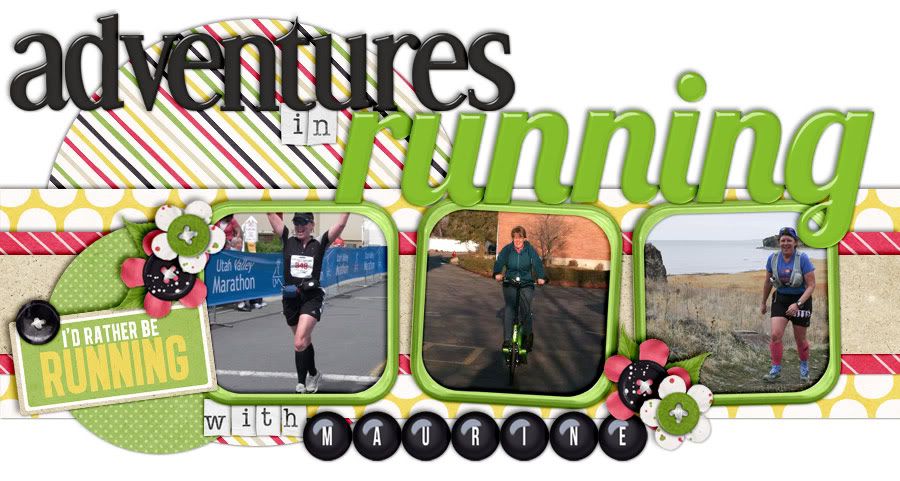In 2004 I started competing in marathons and my first two years I mainly speed walked and learned that I could walk pretty fast - sometimes between 12-13 minutes per mile.
However, in 2006, I decided that I wanted to start running more and overcoming my fear of running and believing that I could not run. That year I started running 100 steps, walking 100 steps. I could occasionally run a couple of miles in a row - but it sure seemed like a lot of work. In addition, no matter how much I ran - I still didn't feel like a runner.
In 2007 I signed up with a personal trainer and lost about 30 pounds and realized that while I had trained a lot in the past - I had not trained to my potential. In my latest marathon - the infamous 2008 St. George Marathon - I maintained running 8 minutes, speed walking 2 minutes the entire time.
I am a member of the Fast Running Blog (www.fastrunningblog.com) and have asked the creator of the blog, Sasha Pachev for advice.
Sasha has said the following:
9/29/2008 Some thoughts on your training. I see no reason why you could not run a 4:20 marathon if you adjusted some things in the training and in the life style. Starting with the principles. Avoid anything impulsive, and choose steady. Steady training, steady eating, steady rest. No hero acts, but no slacking either. More detailed. Train 6 days a week, and take one scheduled day of rest. Your day must not end until you've run at least 4 miles. No walking breaks. Just plod along at 13:00 pace or so, but do not walk for any reason. Even if your running pace slows down to a near-walk, still move the legs and the arms in a running motion. Do not count your walking mileage. At this point do not worry about long runs. Learn to run at least 4 miles 6 days a week without skipping. No excuses, no exceptions. Diet - if you know it is bad, do not eat it. If you know it is good, eat it to satiation. If you run 30 minutes after eating it, and it makes you throw up or feel extremely uncomfortable, it is bad, do not eat it again. This would take some paradigm shift, and self-control, but that is ultimately the secret to eating right. Stay on the trail. Do not look for a short cut. Suggested shortcuts are a trip up a mountain through some nasty thick bushes. Sleep - early to bed, early to rise. I find having a strict bed time curfew very helpful. Other - true commitment and 100% consistency are very important. You need to be willing to sacrifice lesser privileges to achieve higher goals. Work on doing it without a grudge or looking back and saying "I miss my old behavior". The fruits of the old behavior are a 5:00+ marathon. The fruits of the improved behavior are 4:20 marathon. A tree is inseparable from its fruit - the quality of the fruit is determined by the quality of the tree. You must have the courage to abandon the tree that yields 5:00+ marathons. Part of the ability of the 4:20 tree to grow lies in how well you can do the right things even when you are not in the mood to do them. While having the right attitude can provide some physiological benefits, those benefits still accrue at nearly the same rate when you do the right thing with supposedly the wrong attitude. Human physiology is a very just, in a sense, but at the same time very merciless judge. It does not care about intent very much, and rewards you primarily according to your actions.
After following this plan for a few weeks, I have asked for some additional information based upon my age and my recent training results. Here is what he has to say:
10/27/2008 When injury from impact is a concern, the general principle is thatyou should run for as far as you can risk-free, and then cross-train the remainder of your training time. In your situation I would play it by ear - listen to your body and adjust. If you do not feel you are ready for more impact on a particular day, ride a bike or do the elliptical instead. If you feel that fatigue-wise you can deal with extra cross-training on a running day, do that as well. The more aerobic training you do, the better. Of course, make sure to not overdo it - the muscles must be fresh, the energy levels decent, etc,the next day if you've done it right. When cross-training, make sure your heart rate stays at or above your regular running range. E.g when riding a bike it is easy to get lazy and coast. So pick routes with a lot of uphill where you really have to work. On the positive side of things - with consistently good diet, stronger muscles, tendons, and bones, and reduced counter-productive weight your ability to tolerate the impact of running will increase. Based on your recent 5 K time trial, I'd say that with proper training sub-4:00 marathon in St. George next year is a possibility.
St. George is also a downhill course. You are currently able to run about 3:50 marathon pace for 3 miles on a downhill with relative comfort. The biggest obstacle to running the marathon at a certain pace is to be able to run that pace at all for any significant length of distance, and you have already overcome it. The rest is mostly a matter of consistent training.
Can I do it? Only time will tell!








No comments:
Post a Comment